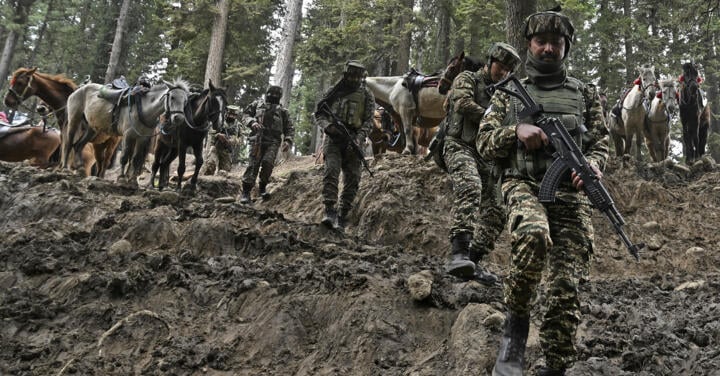Tensions Rise in Kashmir as India Responds to 'Unprovoked' Fire from Pakistan After Deadly Attack
Following a brutal attack on Hindu tourists in Kashmir, India has intensified security operations and accused Pakistan of continued provocation along the de facto border, deepening tensions between the nuclear-armed neighbors.
WORLDPOLITICS
Emmanuel Makome
4/29/20252 min read


India announced on Monday that it had responded to "unprovoked" small arms fire from Pakistan for the fourth consecutive night along the de facto border in Kashmir, amid heightened security operations following last week’s devastating militant attack on tourists.
The April 22 attack, which left 26 people dead, has deeply shaken Hindu-majority India. Authorities have identified two of the three suspected assailants as Pakistani nationals, although Pakistan has denied any involvement and called for an independent investigation. Survivors recounted that militants segregated victims by name and faith before targeting Hindu men at close range in a meadow in Pahalgam, deepening outrage across India.
India has accused Pakistan of backing terrorism in Kashmir — a disputed region the two countries have fought wars over — and swiftly retaliated by suspending the Indus Waters Treaty, a critical water-sharing agreement. Meanwhile, Pakistan closed its airspace to Indian airlines. China, an influential regional player, called for restraint and welcomed any efforts to de-escalate tensions.
The Indian Army reported that multiple Pakistani army posts opened fire around midnight Sunday along the 740-kilometer (460-mile) Line of Control. No casualties were reported, and the Pakistani military did not issue a response. Separately, Pakistan’s military claimed to have killed 71 Islamist militants crossing over from the Afghanistan border over the past three days, indicating regional instability on multiple fronts.
On the ground in Indian-administered Kashmir, security forces have detained around 500 individuals for questioning, searching nearly 1,000 homes and forests in a massive manhunt. At least nine houses have been demolished as part of counterinsurgency operations. While there is a strong national appetite for decisive action, political leaders have urged caution to avoid harming innocent civilians.
"This is the first time in 26 years that I have seen people coming out to say they do not support such attacks," said Jammu and Kashmir Chief Minister Omar Abdullah, speaking to the legislature. "Militancy will end when the people are with us, and today it seems that people are getting there."
Complicating the narrative, The Resistance Front — believed by some analysts to be a front for the Pakistan-based Lashkar-e-Taiba — initially claimed responsibility for the attack but later retracted the statement, blaming a "cyber intrusion" for the false claim.
Despite the rising tensions, life in parts of Pakistan-controlled Kashmir appeared relatively unaffected. Villagers near the border, long accustomed to skirmishes, expressed little fear. "We have grown up in a war-like situation, so fear does not exist in our lexicon," said Shaukat Awan, a social activist from Lanjot. Meanwhile, tourists continued to visit scenic border villages like Keran, bearing messages of peace.
As India deepens its search for militants and maintains a firm stance against cross-border terrorism, the region stands at a critical juncture — where restraint, diplomacy, and determined action will shape the path forward.
Photo: Tauseef Mustafa, AFP
© 2026. Ke Press Global. A Ke Harbor Company. All rights reserved.
FOLLOW KE PRESS GLOBAL ON :
Contact us


